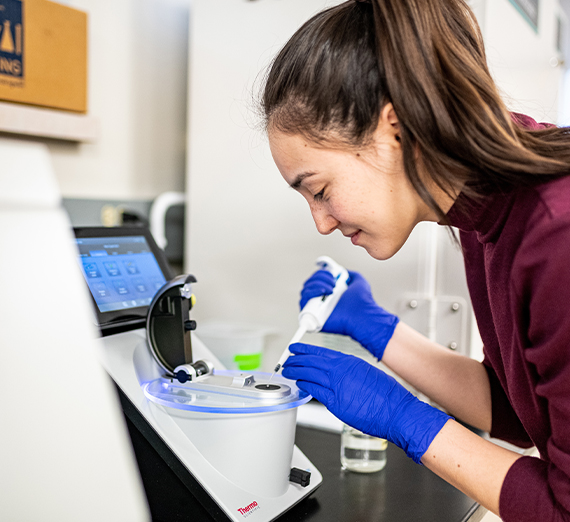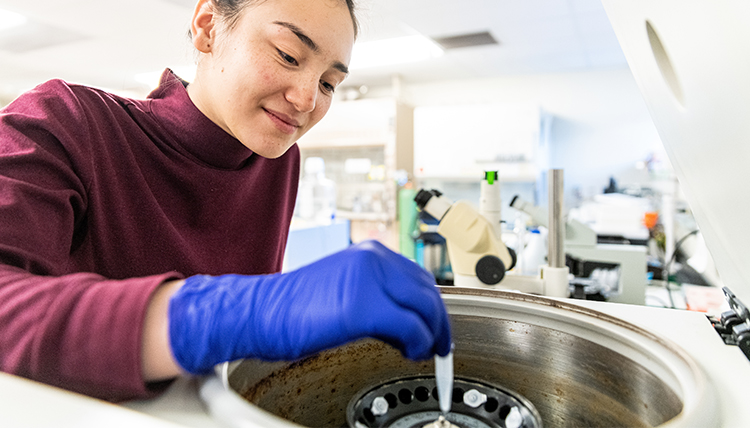Continuing the Vision for Better Health

Donation of lab equipment expands student and faculty research
SPOKANE, Wash. – Katherine R. Tuttle, a Spokane-based physician and scientist known internationally as a leading diabetes and kidney disease specialist, is passing on the instruments of her work to the next generation. Through a donation of research laboratory equipment from the Providence Medical Research Center where she serves as executive director for research at Providence Health Care, chemistry and biology students at Gonzaga University now have expanded opportunities to experience the difference health research can make.
Tuttle would know. She completed medical specialty fellowship trainings in endocrinology and metabolism, and nephrology, in the late 1980s, and since then has served on dozens of national and international committees focused on the care of patients with diabetes and chronic kidney disease (CKD). Today, she is a professor of medicine and co-principal investigator of the Institute of Translational Health Sciences at the University of Washington.
Over the past few decades, Tuttle has regularly received funding from the National Institutes of Health and Centers for Disease Control and Prevention, among many others, to continue learning new ways of protecting people with diabetes from developing CKD that often leads to death or kidney failure. In 2019, Tuttle presented her findings at eight international medical conferences and more than a dozen across the U.S. The Federal Drug Administration (FDA), which evaluates the safety of new medications, recently approved a drug her team tested, not just for its prevention of kidney failure but also the prevention of death – a claim that’s otherwise nearly unheard of in FDA approvals.
As the Providence center’s focus shifted from basic science to clinical and translational research, there emerged the question of what to do with its laboratory equipment.
Tuttle, whose primary academic appointment is at the University of Washington School of Medicine, is well acquainted with UW and Gonzaga’s Regional Health Partnership, which aims to train more students in medical studies in Eastern Washington.
“I know that Gonzaga wants to grow its research, and through the Regional Health Partnership, there will be more opportunities with UW bringing top talent and funding. We want to be part of that effort.”
Mia Bertagnolli, professor of biology and chair of the chemistry and biochemistry department at Gonzaga, had completed a research sabbatical at the Providence Medical Research Center, so Tuttle knew exactly who to contact about the donation of freezers, centrifuges, microscopes and other essential tools, which are invaluable to research as well as student learning.
It wasn’t a simple transaction, Bertagnolli shared. She hired professional movers and engaged Bouten Construction to remove a window to extract two large biosafety hoods.
The extra labor was worth it.

“This makes it possible for our science majors to perform inquiry-based laboratory experiences and participate in independent research projects with faculty mentors,” said Bertagnolli. “It also supports the professional development of faculty members with better and more tools to gather data, which enables them to attract external funding to publish their own research.”
While faculty at GU may be interested in the lab equipment for a broad range of scientific exploration, it’s Tuttle’s ultimate hope that many students and faculty will translate that opportunity back into improving human health.
“My sincere desire would be that the equipment would be used with an eye for developing something that will make life better for people – anything that improves an unmet need for the human condition.”
She added, “We’re thrilled that Providence’s mission of healing will be continued through Gonzaga programs. It’s a small start, with so much more to be done, but I’m excited for what future students will accomplish through their research and training.”
Learn More About Our Partners
